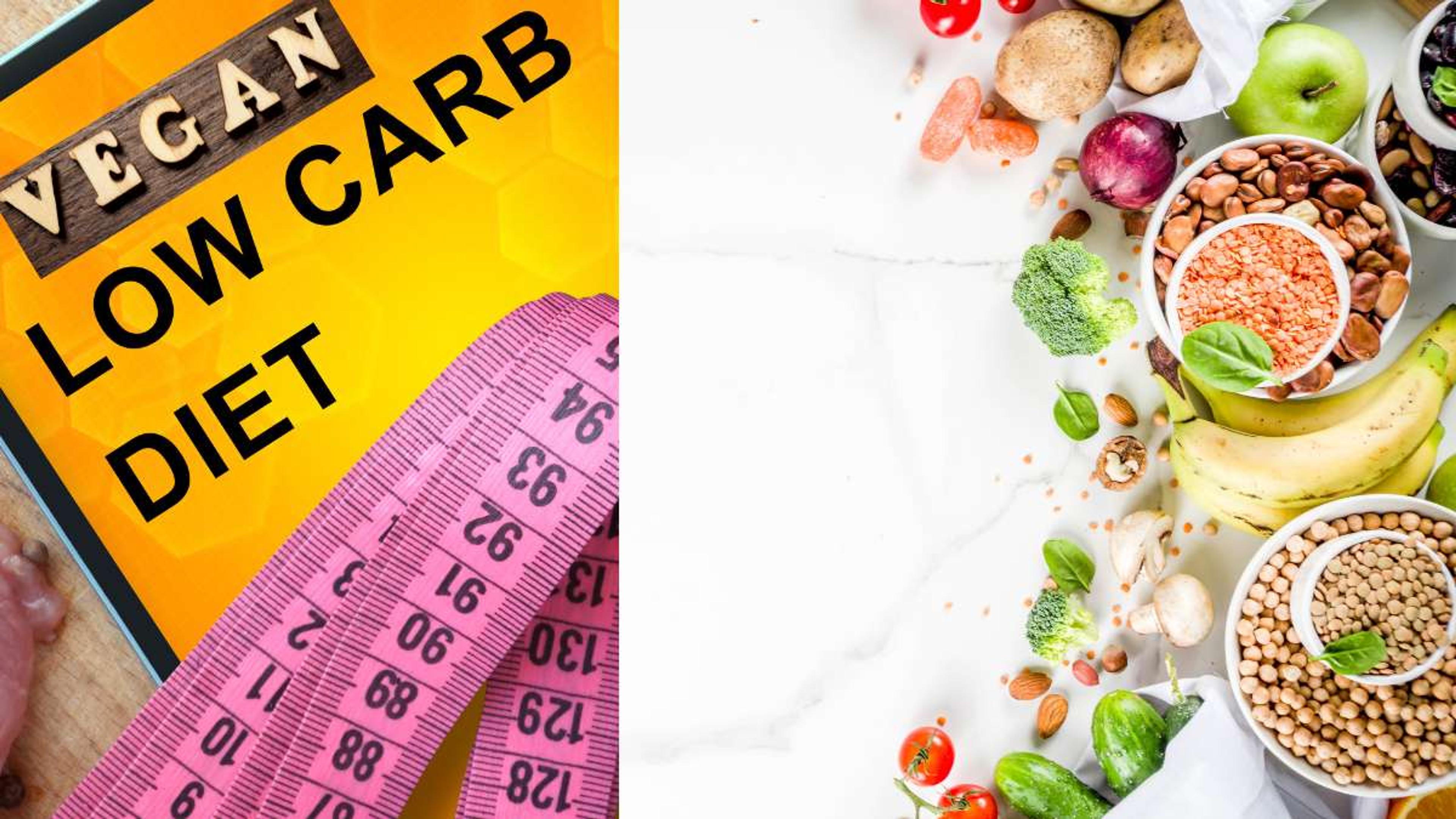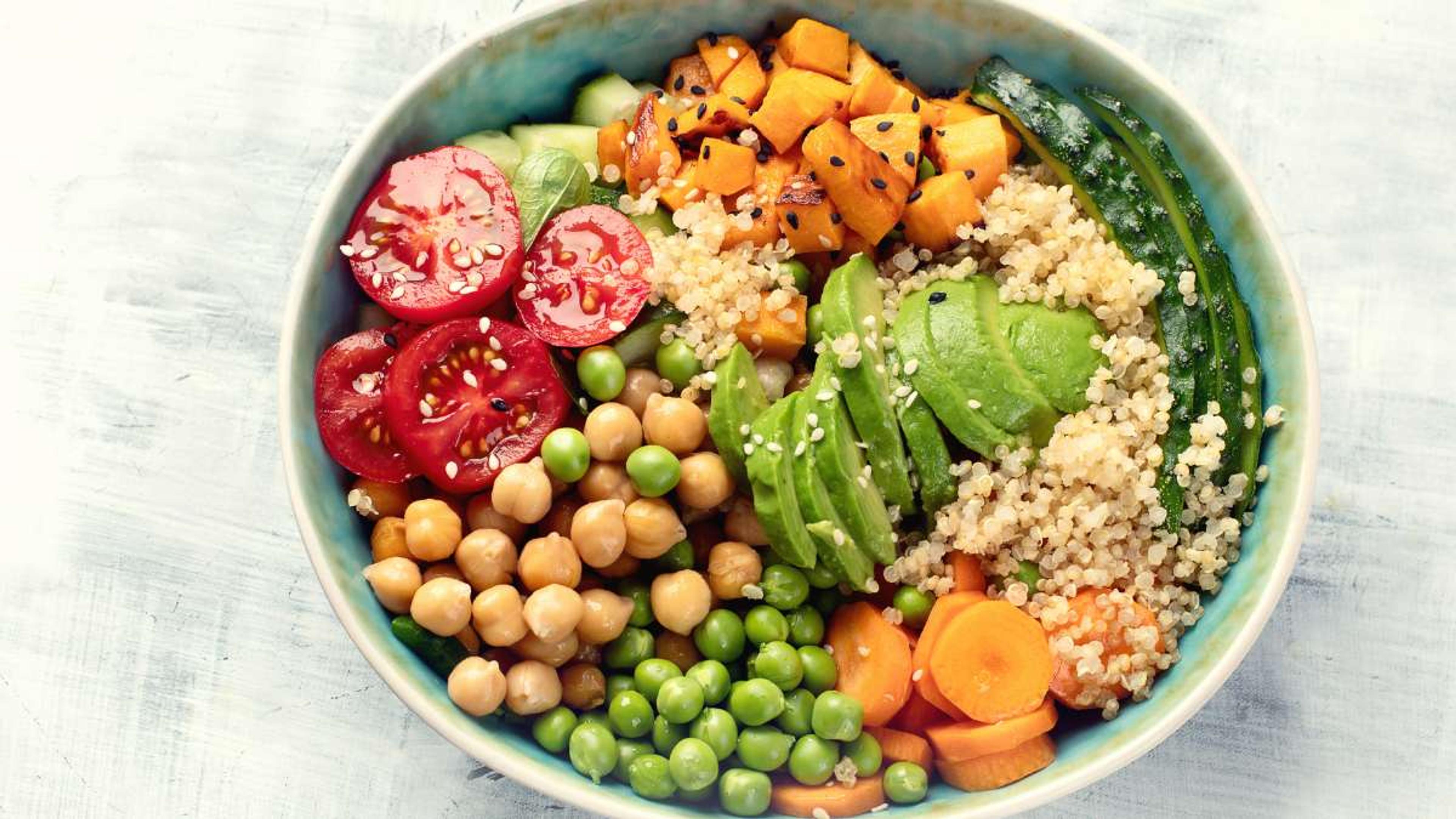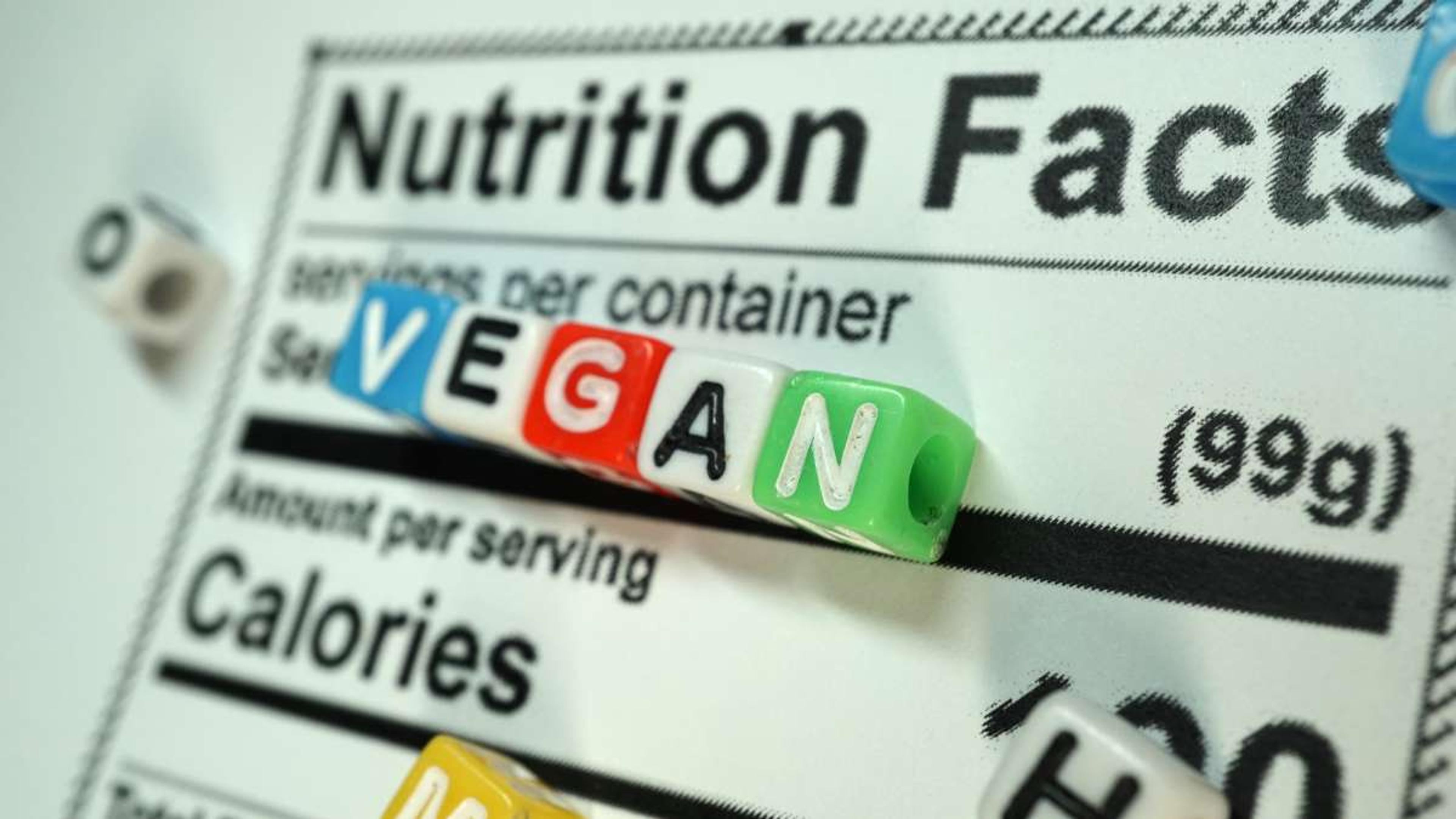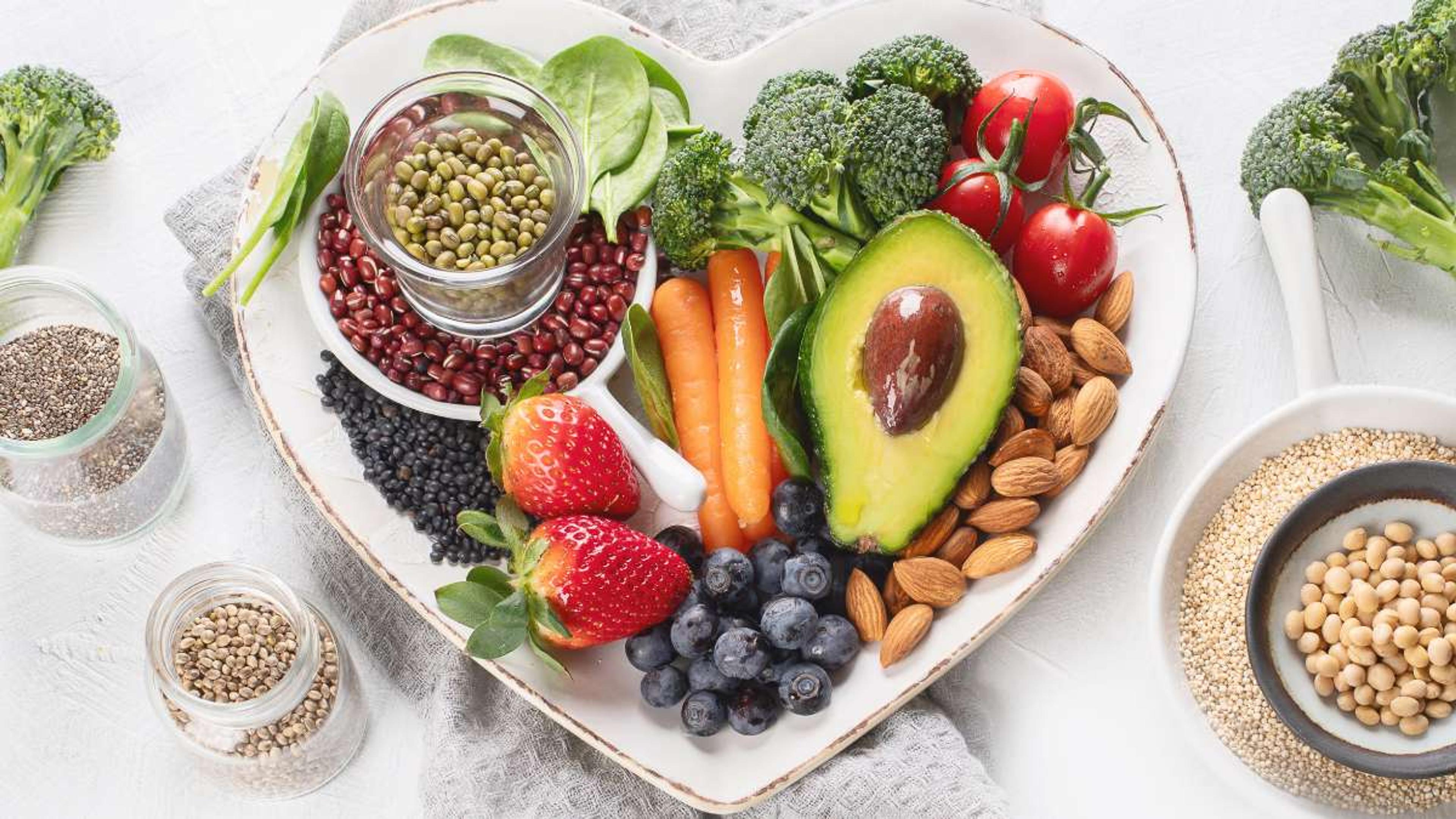Discover Low Carb Vegan Protein Options for a Healthier You

- Key Takeaways
- What is a Low-Carb High-Protein Vegan Diet?
- Top Sources of Low Carb Vegan Protein
- Health Benefits of a Low Carb High Protein Vegan Diet
- Meeting Essential Nutrient Needs on a Low Carb High Protein Vegan Diet
- How to Follow a Low Carb High Protein Vegan Meal Plan
- Conclusion
- FAQs
Are you struggling to find satisfying low-carb, high-protein vegan meals that can help support your fitness goals?
Here's an exciting fact - Lupini beans contain a whopping 25 grams of protein and just 11 grams of net carbs per cup! This ultimate guide simplifies the world of plant-based eating by providing tips on top sources for high proteins, health benefits, meal prepping suggestions, and even a sample meal plan.
Don't wait any longer, dive in and discover the delightful possibilities within a low-carb vegan diet.
Key Takeaways
- A low carb high protein vegan diet combines principles from veganism and low-carbohydrate diets, focusing on plant-based foods that are low in carbs and high in protein.
- Top sources of low-carb, high vegan proteins include tofu, tempeh, seitan, lentils and legumes, nuts and seeds, quinoa and chia seeds, hemp and pea protein powder, fruits and vegetables, as well as miscellaneous options like peanut butter, seaweed, and hummus.
- Benefits of a low carb high protein vegan diet include weight loss support, improved body composition, better digestion due to the high fiber content of plant-based foods, lower environmental impact compared to animal-based diets. However, factors such as the risk of nutrient deficiencies should be taken into consideration when following this type of diet.
What is a Low-Carb High-Protein Vegan Diet?
A Low Carb High Protein Vegan Diet is a unique nutritional approach that combines principles from both veganism and low-carbohydrate dieting. This diet principally relies on plant-based foods which are naturally low in carbohydrates yet high in protein content.
Opposed to the traditional high carb intake usually linked with vegan diets, this specific regimen focuses on lowering carbs while still meeting the daily recommended protein needs.
Making use of tofu, hemp seeds, legumes, and other abundant vegan protein sources is vital for success with this diet. Tofu, for instance, serves as an excellent food choice due to its minimal carb content and absence of animal products.
Hemp seeds too play a significant role by providing substantial amounts of protein along with much-needed fiber for those following a low-carb lifestyle. However complex it might seem at first glance; adhering to a Low Carb High Protein Vegan Diet just requires smart planning and selecting the right mixtures of nutritious foods.
Top Sources of Low Carb Vegan Protein

Tofu, Tempeh & Seitan
Tofu, tempeh, and seitan pack a powerful protein punch. These soy-based foods are a staple in the plant-based diet of many vegans. Tofu is nutrient-rich, boasting healthy fats, fiber, and enough protein to rival animal products.
Ideal for those following a low-carb high-protein vegan meal plan.
Tempeh and seitan also stand out on the vegan menu. Nutrient-dense tempeh delivers essential iron while providing fewer carbs and more protein per serving than its counterparts. Seitan sets itself apart as the “wheat meat”, composed mainly from gluten -- wheat's primary protein source-- it offers an impressive 22 grams of protein per 100 grams making it perfect for individuals concerned about their nutrition or daily protein intake.
Lentils and legumes
Lentils and legumes, staple foods in many diets worldwide, pack a powerful punch when it comes to low carb vegan protein. A single cup of lentils can provide up to 18 grams of protein while only containing 24 grams of net carbs, making them ideal for those following a plant-based diet.
They're not just limited to providing protein either. Lentils and legumes are bursting with other essential nutrients, contributing to overall nutrition as part of a balanced diet.
If you're seeking variety in your dishes without sacrificing high amounts of protein, try lupini beans--a type of legume that delivers an impressive 25 grams of protein and just 11 grams of net carbs per cup! By integrating these into your meals, you'll be able to maintain optimal muscle mass while adhering to the principles of veganism.
Plus, they are delicious replacements for meat in countless recipes!
Nuts and Seeds
Nuts and seeds are excellent sources of low carb vegan protein. Hemp seeds, chia seeds, and flax seeds are especially great options. In just one serving of hemp seeds, you can get 6.3g of protein with only 1.7g of carbs (0.9g net).
Chia seeds offer 4.7g of protein and just 12g of carbs (2g net) per serving. Flax seeds provide 3.8g of protein and only 6g of carbs (0.g net) in a single serving. Pumpkin seeds are also worth mentioning, as they offer 2.9g of low carb vegan protein per serving.
Quinoa and chia seeds
Quinoa and chia seeds are both excellent sources of low carb vegan protein. Quinoa, a whole grain, not only provides protein but also fiber. A cup of cooked quinoa contains about 8 grams of protein.
Chia seeds, on the other hand, pack an impressive amount of protein - 18.29 grams per 100 grams! Even a small serving of 20 grams offers around 3.65 grams of protein. So, whether you're looking to add variety to your meals or boost your protein intake, incorporating quinoa and chia seeds into your diet can be a great choice.
Hemp and pea protein powder
Hemp and pea protein powder are excellent choices for individuals following a low-carb vegan diet. Pea protein powder contains an impressive 27g of protein per serving while only containing 2g of carbs.
It is also a good source of essential amino acids, making it a complete protein option. On the other hand, hemp protein powder is not only rich in fiber and iron but also contains all the essential amino acids.
Both hemp and pea protein powders are considered top sources of low-carb vegan protein, providing a nutritious alternative to animal-based proteins. With their high protein content and minimal carbs, they are ideal for those looking to meet their dietary needs while staying on track with their low-carb eating plan.
Fruits & Vegetables
Fruits and vegetables are an essential part of a plant-based diet, which includes other plant-based protein sources. They are packed with vital nutrients, fiber, and antioxidants to support overall health.
Nonstarchy vegetables like broccoli and cauliflower are particularly low in net carbs, making them great choices for those following a low carb vegan high protein diet. Incorporating a variety of colorful fruits and nutrient-rich veggies into your meals can help you meet your nutritional needs while adding flavor and freshness to your plate.
Miscellaneous (Peanut Butter, Seaweed, Hummus, etc.)
Peanut butter, seaweed, and hummus are excellent sources of low-carb vegan protein. These foods pack a punch in terms of nutrients while being high in protein and low in carbohydrates.
Peanut butter is not only delicious but also rich in protein, healthy fats, and minerals like magnesium and potassium. Seaweed is a great option for vegans as it contains essential amino acids along with vitamins A, C, E, and K.
Hummus made from chickpeas provides a good amount of protein along with fiber and various micronutrients. Including these miscellaneous options in your low-carb vegan diet can add variety to your meals while boosting your protein intake effortlessly.
Health Benefits of a Low Carb High Protein Vegan Diet
A low carb high protein vegan diet offers numerous health benefits, including support for weight loss and management, improved body composition, and potential improvements in overall health.
Supports weight loss and management
A low-carb high protein vegan diet is not only beneficial for overall health, but it can also support weight loss and management. By focusing on plant-based protein sources like tofu, lentils, nuts, and seeds, you can increase your satiety levels and reduce cravings for unhealthy foods.
Additionally, these plant-based proteins are often lower in calories and fat compared to animal protein counterparts. This means that you can enjoy a satisfying meal without consuming excess calories or unhealthy fats.
By incorporating a variety of low-carb high-protein vegan meals into your diet, you can achieve your weight loss goals while still ensuring proper nutrition and satisfaction.
Following a healthy low-carb vegan lifestyle has been shown to be effective in achieving weight loss goals. A study published in the Journal of General Internal Medicine found that individuals following a low-carbohydrate plant-based diet lost more weight than those on a conventional low-fat vegetarian diet.
This is because reducing carbohydrate intake helps regulate blood sugar levels and insulin response which leads to more efficient fat burning in the body. In addition to supporting weight loss, maintaining a high-protein intake on a vegan diet helps preserve muscle mass during calorie restriction - important for long-term success with managing weight.
Improved body composition
A low carb high protein vegan diet can lead to improved body composition. By reducing carbohydrate intake and increasing protein consumption, this type of dietary approach may assist with weight loss and help individuals achieve a healthier balance of lean muscle mass and body fat.
When following a well-planned vegetarian meal plan that is both low in carbs and high in protein, it is possible to make positive changes to your overall body composition. This can contribute to better physical health, enhanced athletic performance, and increased self-confidence.
Other benefits
Following a low carb high protein vegan diet offers more than just weight loss and improved body composition. One of the significant benefits is its positive impact on digestion. With its high fiber content, a plant-based diet supports healthy digestion and can help prevent constipation, promote regular bowel movements, and maintain optimal gut health.
Moreover, adopting a low carb high protein vegan lifestyle has been shown to have a lower environmental impact compared to animal-based diets. By reducing reliance on animal products, individuals contribute to sustainability efforts that aim to protect our planet for future generations.
Potential downsides
A low carb high protein vegan diet, while beneficial in many ways, can have some potential downsides to be aware of. One concern is the risk of nutrient deficiencies, as certain essential nutrients like vitamin B12 and omega-3 fatty acids are predominantly found in animal-based foods.
It's important for vegans to ensure they're getting enough of these nutrients through supplements or fortified foods. Additionally, individuals following a vegan keto diet may also face a higher risk of nutrient deficiencies due to the restrictive nature of the diet.
Another consideration is that some people may experience blood sugar swings on a vegan diet with lower protein intake, which can affect their overall energy levels throughout the day.
Meeting Essential Nutrient Needs on a Low Carb High Protein Vegan Diet
To ensure you're meeting all your essential nutrient needs on a low carb high protein vegan diet, it's crucial to prioritize protein sources and choose nutrient-dense plants. Additionally, supplementing with vitamin B12, counting carbs, and incorporating healthy fats can help you achieve optimal nutrition.
Discover more about these strategies by reading the full blog post!

Prioritizing protein sources & Choosing nutrient-dense plants
A low carb high protein vegan diet requires careful consideration when it comes to prioritizing protein sources and choosing nutrient-dense plants. To ensure adequate protein intake, it is important to include foods such as tofu, tempeh, lentils, nuts, seeds, and quinoa in your meals.
These plant-based sources are not only rich in protein but also provide essential nutrients like iron, calcium, and magnesium. By incorporating a variety of fruits and vegetables into your diet, you can further boost your nutrition and overall health.
Remember that on a low carb high protein vegan diet, the emphasis should be on selecting wholesome options that are both delicious and packed with key nutrients. So go ahead and explore the wonderful world of plant-based proteins!
Supplementing with vitamin B12
Supplementing with vitamin B12 is crucial for individuals following a vegan diet. Vegans and vegetarians often have low intake of this essential nutrient, putting them at risk of deficiency.
Vitamin B12 is primarily found in animal products, so it can be challenging to obtain enough from plant-based sources alone. It's important to ensure adequate levels of vitamin B12 to support overall health and prevent deficiencies.
While fortified plant-based foods can provide some vitamin B12, supplementation is recommended to meet daily requirements and maintain optimal levels.
Counting carbs and incorporating healthy fats
A crucial aspect of following a low-carb high-protein vegan diet is counting carbs and incorporating healthy fats. By monitoring your carbohydrate intake, you can ensure that you are staying within the desired range for this particular diet.
In addition, incorporating healthy fats into your meals can help provide essential nutrients and promote satiety. Some examples of healthy fat sources include avocado, nuts, seeds, and olive oil.
These fats not only add flavor to your dishes but also provide important vitamins and minerals that are beneficial for overall health. By paying attention to both carbs and healthy fats, you can optimize your nutrient intake while enjoying a delicious and satisfying vegan meal plan.
How to Follow a Low Carb High Protein Vegan Meal Plan
To follow a low carb high protein vegan meal plan, start by prioritizing protein sources such as tofu, lentils, and nuts. Choose nutrient-dense plants like spinach and kale to meet essential nutrient needs.
Supplement with vitamin B12 and count carbs while incorporating healthy fats. To make it easier, try meal prepping and dining out using these guidelines.

Meal-prepping tips
- Plan your meals in advance to ensure you have all the necessary ingredients on hand.
- Batch cook larger quantities of plant-based proteins such as tofu, tempeh, and lentils to use throughout the week.
- Pre-cut and wash your veggies for easy snacking and to save time during meal preparation.
- Invest in quality food storage containers to store your prepped meals and snacks.
- Use versatile ingredients like quinoa, chia seeds, and nuts that can be added to various dishes for extra protein and nutrients.
- Experiment with different flavor profiles and seasonings to keep your meals interesting and flavorful.
- Portion out your meals into individual containers for easy grab-and-go options for work or school lunches.
- Label your prepped meals with the date they were made to ensure freshness and reduce food waste.
- Incorporate healthy fats like avocado or olive oil into your meal prep to help keep you satiated throughout the day.
- Don't be afraid to get creative with plant-based proteins sources like seitan or hemp protein powder in recipes.
Sample meal plan
Here are two sample meal plans on a low carb high protein vegan diet:
MEAL IDEA 01
1. Breakfast
- Scrambled tofu with spinach and mushrooms
- Avocado slices
- Whole grain toast
2. Snack
- Handful of almonds
3. Lunch
- Lentil salad with mixed greens, cherry tomatoes, and cucumber
- Homemade vinaigrette dressing
4. Snack
- Celery sticks with peanut butter
5. Dinner
- Grilled tempeh with roasted asparagus and quinoa
- Steamed broccoli
6. Snack
- Chia seed pudding made with almond milk and berries
MEAL IDEA 02
1.Breakfast
- Smoothie made with pea protein powder, almond milk, spinach, and banana
2. Snack
- Edamame beans
3. Lunch
- Chickpea salad wrap with lettuce, tomato, and hummus in whole wheat tortilla
4. Snack
- Kale chips
5. Dinner
- Baked tofu with stir-fried bok choy and brown rice
6. Snack
- Apple slices with almond butter
Tips for Dining out on a low carb high protein vegan diet
Eating out while following a low carb high protein vegan diet doesn't have to be challenging. Here are some simple tips to help you make the best choices:
- Look for restaurants that offer vegan options: Seek out establishments that cater to vegans or have vegan-friendly menu items.
- Choose vegetable-based dishes: Opt for salads, roasted vegetables, stir-fried veggies, or veggie-based soups as your main course.
- Ask for modifications: Don't hesitate to ask the server if they can make substitutions or adjustments to accommodate your low carb high protein needs.
- Order plant-based protein sources: Look for dishes with tofu, tempeh, seitan, or legumes such as lentils and chickpeas as your protein source.
- Avoid carb-heavy sides and dressings: Skip the bread basket and choose a salad dressing without added sugars or choose olive oil and vinegar instead.
- Be mindful of hidden carbs: Avoid sauces and marinades that may contain added sugars or starchy thickeners.
- Enjoy non-starchy sides: Opt for steamed or grilled vegetables like broccoli, asparagus, or kale as your side dish instead of starchy options like potatoes or rice.
- Research and plan ahead: Before going to a restaurant, check their online menu to see if they have suitable options for your dietary needs.
Conclusion
In conclusion, adopting a low-carb vegan high-protein diet can offer numerous health benefits, including weight loss, improved body composition, and increased nutrient intake. By incorporating a variety of plant-based protein sources into your meals and supplementing with essential nutrients like vitamin B12, you can successfully follow a low-carb vegan meal plan.
Whether you're looking to lose weight or simply improve your overall health, this ultimate guide provides all the information and resources you need to get started on your low-carb vegan journey.
FAQs
1. Can I get enough protein on a low carb vegan diet?
Yes, it is possible to meet your protein needs on a low carb vegan diet by incorporating plant-based protein sources such as tofu, tempeh, seitan, lentils, beans, quinoa, and nuts into your meals.
2. What are some examples of low carb vegan high protein meals?
Some examples of low carb vegan high protein meals include chickpea salad with mixed greens and tahini dressing, grilled tofu and vegetable skewers with quinoa, lentil curry with cauliflower rice, or roasted tempeh with steamed broccoli and quinoa.
3. How can I replace meat in my low carb vegan meals?
You can replace meat in your low carb vegan meals by using plant-based alternatives such as tofu, tempeh, seitan or textured vegetable protein (TVP). These options provide a good amount of protein while keeping the carbs low.
4. Are there any specific tips for meal planning on a low carb vegan high protein diet?
When meal planning for a low carb vegan high protein diet:
- Include a variety of plant-based proteins to ensure you get all essential amino acids.
- Incorporate non-starchy vegetables for added nutrients and fiber.
- Choose healthy fats like avocados or nuts to balance out your macronutrients.
- Experiment with different spices and herbs to add flavor without relying on high-carb sauces or dressings.
- Plan ahead and prep ingredients in advance to make cooking easier during busy days.

